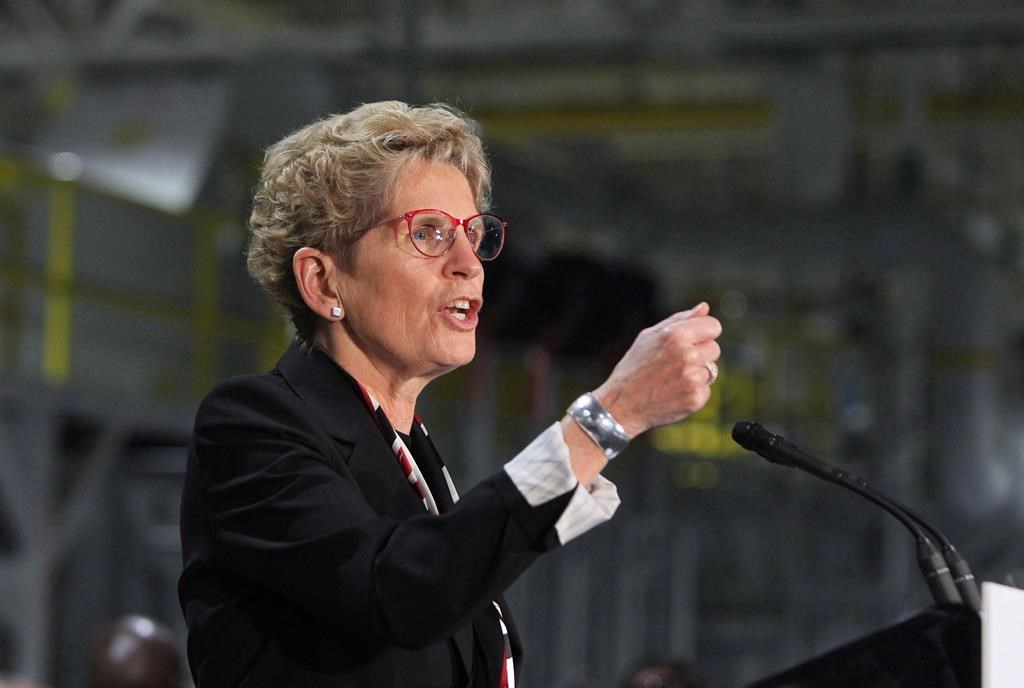Support strong Canadian climate journalism for 2025
Ontario Premier Kathleen Wynne was "pleased" that New York has dropped proposed Buy American provisions from its state budget, but she remained concerned Saturday about U.S. protectionism and uncertainty about the North American Free Trade Agreement.
Governor Andrew Cuomo had proposed the New York Buy American Act, which would have required all state entities to buy from American companies on new purchases worth more than US$100,000. But legislators reached a deal Friday that left Buy American provisions out.
Wynne called it a success for her government's lobbying efforts in Albany, saying it "reflects a clear understanding among New York state's political leaders of just how important our ongoing partnership is to both economies."
Foreign Affairs Minister Chrystia Freeland also praised the development, calling it "great news for (Canadian) workers. "We worked together with NY friends to protect our shared prosperity," she said on Twitter.
If New York's Buy American provisions had passed, Wynne and her cabinet had planned to introduce legislation that would have allowed the province to respond "strongly," she said.
The legislation would have concerned Ontario's own purchasing policies and would have been a "proportional response" to New York's Buy American policy, Wynne told The Canadian Press.
"The response would be about defending the interests of Ontario's workers and Ontario's businesses in proportion to what the Buy American legislation would have been," she said.
Ontario had feared New York's Buy American policy could have had a domino effect with other states if it was approved.
"I hope we don't have to do this too many times," said Wynne. "I hope the message is clear."
Wynne and Economic Development Minister Brad Duguid have been increasingly vocal about their concerns over signs of increasing protection in the U.S., not only in Buy American policies, but also speculation about a border adjustment tax and rhetoric about the pending renegotiation of NAFTA.
But despite calling for free trade, Wynne and Duguid have said there will be things Ontario will want to "protect" in talks on NAFTA.
"The thing is, in free trade agreements there's always a give-and-take, in terms of particular sectors and particular jurisdictions," said Wynne. "That's why it's so important that we be at the table, and close to the conversations."
It's the same approach Ontario took in Canada-European Union Comprehensive Economic and Trade Agreement (CETA), she said.
"Auto and agriculture are two that will always be important to Ontario in these discussions, and we just need to make sure we find the right balance while being a free-trading jurisdiction," she said.
Wynne has been meeting with Ontario industry leaders and found there are different opinions on NAFTA, with some wanting to see no change at all, to tweaks, to very dramatic changes, she said.
"In Ontario, our auto sector, our agriculture and food processing sectors, are very much tied to those American export markets, and very integrated into the American economy," she said. "So we will be watching in those areas and giving our input into the federal government every step of the way."
Wynne is heading to Illinois Monday to talk about trade with the business community and Gov. Bruce Rauner.
She has already met with the governors of Michigan and Vermont, and spoken with governors of Ohio, Indiana, Wisconsin, Colorado, Mississippi, Arkansas and Tennessee, as part of a strategy to win over high-profile allies to Ontario's views on trade.
Wynne said she doesn't want Ontarians to have to worry about protectionism threatening Ontario's economy.
"It is an uncertain time, there's no doubt about that and it's very important that, as premier, I play very close attention to, and put resources into, that protection of our interests — not protection of our border, but protection of our interests," she said.




Comments